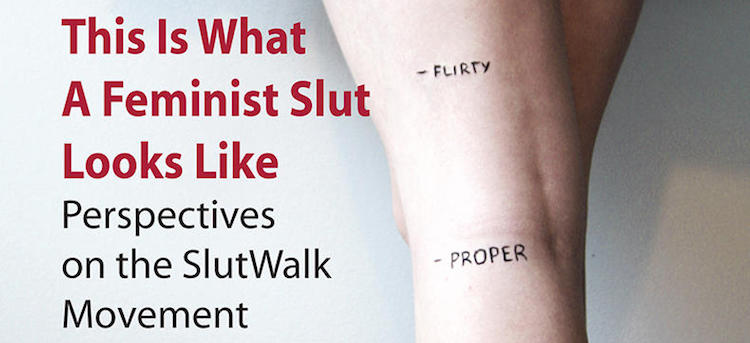
In 2011, the first SlutWalk was held in Toronto, launching a feminist campaign to assert female sexual autonomy and reclaim the epithet ‘slut’. In a Guardian op-ed published a few weeks later (9th May 2011), Gail Dines and Wendy J. Murphy argued that the SlutWalk movement was fighting a lost cause: “The term slut is so deeply rooted in the patriarchal “madonna/whore” view of women’s sexuality that it is beyond redemption. The word is so saturated with the ideology that female sexual energy deserves punishment that trying to change its meaning is a waste of precious feminist resources.”
Writing in The Daily Telegraph (12th May 2011), Germaine Greer supported the SlutWalkers, though she cautioned that it is “difficult, probably impossible, to reclaim a word that has always been an insult.” (And she should know, having attempted a similar reappropriation of the c-word in the 1970s.) Greer pointed out that, although ‘slut’ has always been a pejorative, it also refers to slovenly women rather than promiscuous ones: “Yes, I am a slut. My house could be cleaner. My sheets could be whiter. I could be without sexual fantasies too—pure as the untrodden snow—but I’m not. I’m a slut and proud.” In Womanwords, Jane Mills shows that, like many misogynist terms, it was previously a unisex pejorative.
Katharine Whitehorn was the first feminist to confront slut-shaming and reappropriate ‘slut’ as a positive term. Writing sixty years ago in The Observer (29th December 1963), she self-identified as a slut in the word’s original sense: “Have you ever taken anything back out of the dirty-clothes basket because it had become, relatively, the cleaner thing?... Honest answers should tell you, once and for all, whether you are one of us: the miserable, optimistic, misunderstood race of sluts.”
This Is What a Feminist Slut Looks Like: Perspectives on the SlutWalk Movement, edited by Alyssa Teekah, Erika Jane Scholz, May Friedman, and Andrea O’Reilly, was published in 2015. The book’s standout chapter is Dirty Talk, a scholarly cultural history of ‘slut’ by Nancy Effinger Wilson, who seeks to “dismantle the misogynist ideology on which the word’s pejorative meaning is predicated.” (Taylor Swift reappropriated the word with her song Slut!, included on the rerecorded edition of her album 1989 released last year.)
Writing in The Daily Telegraph (12th May 2011), Germaine Greer supported the SlutWalkers, though she cautioned that it is “difficult, probably impossible, to reclaim a word that has always been an insult.” (And she should know, having attempted a similar reappropriation of the c-word in the 1970s.) Greer pointed out that, although ‘slut’ has always been a pejorative, it also refers to slovenly women rather than promiscuous ones: “Yes, I am a slut. My house could be cleaner. My sheets could be whiter. I could be without sexual fantasies too—pure as the untrodden snow—but I’m not. I’m a slut and proud.” In Womanwords, Jane Mills shows that, like many misogynist terms, it was previously a unisex pejorative.
Katharine Whitehorn was the first feminist to confront slut-shaming and reappropriate ‘slut’ as a positive term. Writing sixty years ago in The Observer (29th December 1963), she self-identified as a slut in the word’s original sense: “Have you ever taken anything back out of the dirty-clothes basket because it had become, relatively, the cleaner thing?... Honest answers should tell you, once and for all, whether you are one of us: the miserable, optimistic, misunderstood race of sluts.”
This Is What a Feminist Slut Looks Like: Perspectives on the SlutWalk Movement, edited by Alyssa Teekah, Erika Jane Scholz, May Friedman, and Andrea O’Reilly, was published in 2015. The book’s standout chapter is Dirty Talk, a scholarly cultural history of ‘slut’ by Nancy Effinger Wilson, who seeks to “dismantle the misogynist ideology on which the word’s pejorative meaning is predicated.” (Taylor Swift reappropriated the word with her song Slut!, included on the rerecorded edition of her album 1989 released last year.)
